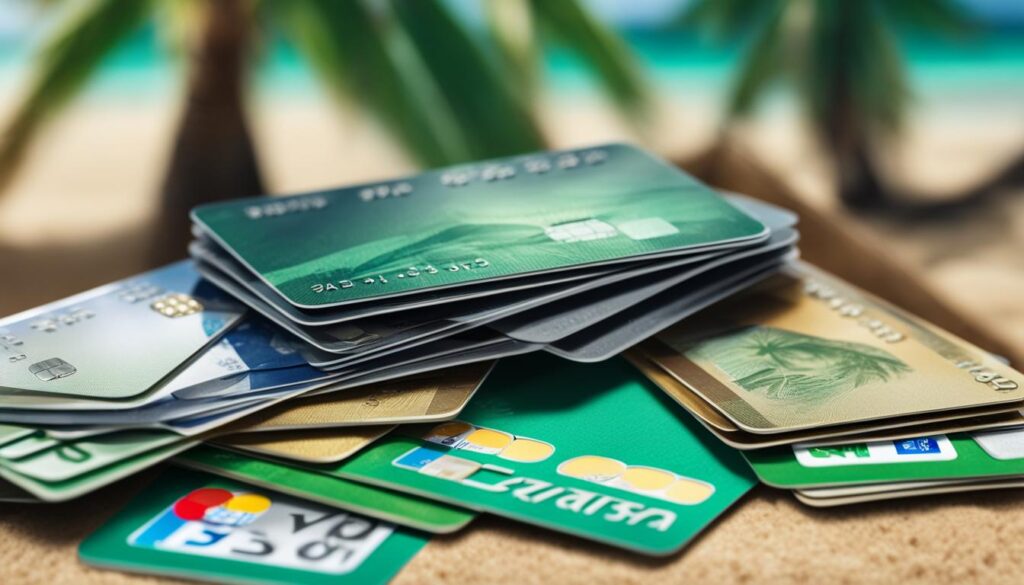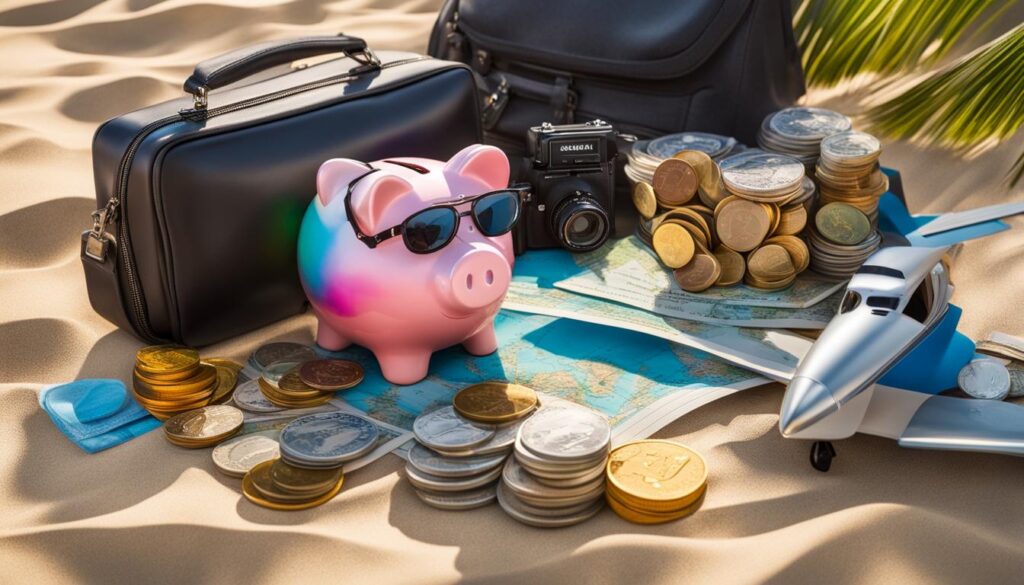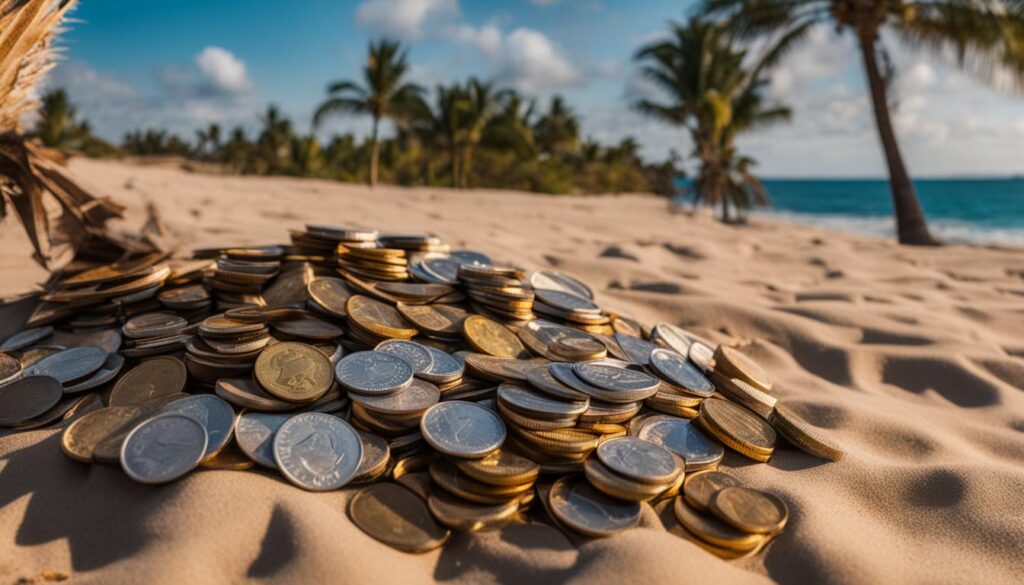Planning a vacation can be an exciting experience, but it’s important to keep a close eye on your budget to ensure you don’t overspend. By tracking your travel budget and making smart spending decisions, you can make the most of your vacation without breaking the bank. In this article, we will explore strategies for travel budget tracking, managing vacation spending, and making your U.S vacations financially savvy.
Key Takeaways:
- Start budgeting early to save for your vacation.
- Utilize cash back rewards credit cards to save on travel expenses.
- Consider earning extra money through side hustles to fund your vacation.
- Cut back on unnecessary expenses to allocate more towards your vacation fund.
- Find hidden money in unused gift cards or payment sites.
Budgeting for Your Vacation
Planning and budgeting for your vacation early is essential to ensure you have the funds to cover all your expenses. By creating a sinking fund and saving a certain amount of money every month, you can steadily accumulate the necessary funds to cover the entire cost of your vacation. This method allows you to avoid relying on credit and accruing debt, giving you peace of mind and financial stability during your trip.
One effective way to save for your vacation is by utilizing high-yield savings accounts. These accounts offer better interest rates than traditional savings accounts, helping your money grow faster over time. Additionally, consider putting a percentage of each paycheck directly into a designated travel account. This automatic saving method ensures that you are consistently setting aside money for your vacation and helps you stay on track with your budgeting goals.
Remember, budgeting for your vacation is not just about saving money but also about being mindful of your spending. Consider creating a detailed budget that outlines all your anticipated expenses, including accommodations, transportation, meals, activities, and any other costs associated with your trip. This will help you better understand how much money you need to save and allow you to make informed decisions about where you can cut back on expenses to stay within your budget.
Table: Monthly Savings Goals
| Expense Category | Monthly Savings Goal |
|---|---|
| Accommodations | $500 |
| Transportation | $300 |
| Meals | $200 |
| Activities | $150 |
| Miscellaneous | $100 |
| Total | $1,250 |
The table above illustrates a sample monthly savings goal for various expense categories. Adjust the amounts based on your unique vacation plans and desired level of comfort. By breaking down your savings goal into smaller monthly amounts, you can create a realistic budget and ensure that you are consistently working towards your vacation savings target.
Remember, budgeting for your vacation is a critical step in ensuring that you have a stress-free and enjoyable trip. By planning ahead, saving diligently, and being mindful of your spending, you can make your dream vacation a reality without compromising your financial well-being.
Utilizing Cash Back Rewards Credit Cards
One effective strategy for saving money on travel expenses is to utilize cash back rewards credit cards. These cards offer various benefits, including sign-up bonuses and earning cash back on purchases. By strategically using these cards for vacation-related expenses, individuals can save money and reduce the overall cost of their trip.
There are several cash back rewards credit cards available in the market, each with its own unique features and benefits. For example, the XYZ Cashback Card offers a 5% cash back on travel purchases and a 1% cash back on all other purchases. The ABC Rewards Card, on the other hand, offers a 2% cash back on all purchases and has a generous sign-up bonus of $200 when spending $1,000 in the first three months.
By using these cash back rewards credit cards for travel expenses such as flights, accommodations, and dining, individuals can accumulate cash back rewards that can be used to cover a significant portion of their vacation costs. This can result in substantial savings and allow travelers to make the most of their budget while enjoying their trip.
| Credit Card | Cash Back Benefits |
|---|---|
| XYZ Cashback Card | 5% cash back on travel purchases 1% cash back on all other purchases |
| ABC Rewards Card | 2% cash back on all purchases $200 sign-up bonus when spending $1,000 in the first three months |
When using cash back rewards credit cards, it’s important to remember to pay off the balance in full each month to avoid interest charges. Additionally, comparing the benefits and rewards offered by different cards can help individuals choose the one that suits their travel needs and spending habits the best.

Maximizing Cash Back Rewards
To maximize the benefits of cash back rewards credit cards, consider using cash-back portals when making vacation purchases. Cash-back portals are online shopping platforms that offer additional cash back and discounts when shopping with their partner retailers. By starting their online shopping journey through these portals, travelers can earn extra cash back on top of the rewards offered by their credit cards.
Furthermore, it’s advisable to monitor and take advantage of limited-time promotions or bonus categories offered by cash back rewards credit cards. Some cards may offer increased cash back rates for specific categories during certain periods, such as higher rewards for hotel bookings or car rentals. Staying informed about these promotions can help travelers maximize their savings and get the most value from their cash back rewards credit cards.
In conclusion, utilizing cash back rewards credit cards is a smart way to save money on travel expenses. By strategically using these cards and taking advantage of their benefits, individuals can accumulate cash back rewards that can significantly reduce the overall cost of their vacation. Coupled with other money-saving strategies, cash back rewards credit cards can help travelers enjoy their trip while staying within their budget.
Earning Extra Money for Your Vacation
When it comes to saving for your dream vacation, finding ways to earn extra money can make a significant difference. By taking on side hustles or part-time jobs, you can boost your vacation fund and cover those additional expenses. Here are some practical ideas to consider:
Rent out your place
If you have an extra room or property, consider renting it out on vacation rental platforms like Airbnb. This can be a great way to earn passive income while you’re away and help offset the cost of your own accommodation during your trip.
Hold a yard sale
Clear out your closet and garage by holding a yard sale or selling unwanted items online. Not only will you declutter your home, but you’ll also earn some extra cash to put towards your vacation expenses.
Take online surveys or freelance
Participating in online surveys or signing up for freelance work can be an easy way to earn extra money in your spare time. Websites like Survey Junkie or Upwork offer opportunities to complete surveys or find freelance gigs that match your skills.

No matter which method you choose, every little bit counts when it comes to saving for your vacation. Be proactive and explore different avenues to earn that extra money, and before you know it, you’ll be well on your way to funding your dream getaway.
Cutting Back on Expenses
When it comes to saving for your vacation, cutting back on expenses can play a crucial role in boosting your vacation fund. By making small adjustments to your daily spending habits, you can free up more money to put towards your travel goals. Here are some practical tips to help you cut back on expenses and save for your dream vacation:
- Track Your Spending: Start by keeping track of your expenses to identify areas where you can cut back. Use budgeting apps or simply keep a spending journal to record your daily expenses.
- Reduce Dining Out: Eating out can quickly add up and eat into your vacation budget. Consider cooking at home more often and pack your lunches for work to save on dining expenses.
- Minimize Impulse Shopping: Avoid impulse purchases by creating a shopping list and sticking to it. Give yourself a cooling-off period before making any non-essential purchases to determine if it’s really something you need.
- Eliminate Subscriptions: Review your recurring subscriptions and consider canceling any that you no longer use or need. This includes streaming services, gym memberships, and magazine subscriptions.
- Lower Utility Bills: Look for ways to reduce your utility bills by turning off lights when not in use, adjusting the thermostat, and unplugging electronics when they’re not in use.
By implementing these strategies, you can make significant progress in cutting back on expenses and building up your vacation fund. Remember, every little bit adds up, so even small changes can make a big difference over time. Stay disciplined and keep your eye on the prize – that dream vacation awaits!
| Expense Category | Potential Savings |
|---|---|
| Dining Out | $100 per month |
| Subscription Services | $50 per month |
| Impulse Shopping | $75 per month |
| Utility Bills | $50 per month |
Table: Potential Monthly Savings from Cutting Back on Expenses
Finding Hidden Money for Your Vacation
When it comes to saving money for your vacation, every little bit helps. One often overlooked source of extra funds is hidden money that can be found in unexpected places. By exploring payment sites, checking for unclaimed property, and utilizing unused gift cards, you can uncover hidden funds that can be put towards your vacation savings.
Payment sites such as PayPal often have small amounts of money sitting untouched in accounts. Forgotten refunds, rebates, or even payments from friends can add up over time. By logging into your payment site accounts and checking for any available balances, you may be surprised at how much extra money you can find. Remember to transfer these funds to your vacation savings account for safekeeping.
Another source of hidden money can be found in unclaimed property. Various state and federal websites allow you to search for any unclaimed funds or assets that may be owed to you. This could include forgotten bank accounts, insurance policies, or even uncashed checks. Taking the time to search for unclaimed property can yield unexpected results and provide a valuable boost to your vacation savings.
“By exploring payment sites, checking for unclaimed property, and utilizing unused gift cards, you can uncover hidden funds that can be put towards your vacation savings.”
Additionally, unused gift cards or store credits can be a treasure trove of hidden money. Take inventory of any gift cards or store credits that you may have received as gifts or accumulated over time. By using these credits towards vacation expenses or converting them into cash, you can stretch your vacation budget even further.

Tips for Planning a Budget-Friendly Vacation
Planning a vacation can be an exciting and fulfilling experience. However, it’s essential to plan your trip wisely to ensure it remains budget-friendly. By following these tips, you can save money while still enjoying a memorable vacation.
1. Plan Early
One of the best ways to save money on your vacation is to start planning early. By booking your flights, accommodations, and activities well in advance, you can take advantage of early bird discounts and secure the best deals. Keep an eye out for flash sales and promotional offers that may be available during the planning phase.
2. Use a Travel Agent
Consider using a travel agent to help you navigate the complexities of vacation planning. Travel agents have access to exclusive deals and discounts and can often negotiate better prices on your behalf. They can also provide valuable recommendations and insider tips, ensuring you make the most of your budget.
3. Utilize Travel Rewards Credit Cards
Take advantage of travel rewards credit cards to earn points or miles for your purchases. These rewards can be redeemed for flights, accommodations, and other travel-related expenses, helping you save money on your vacation. Be sure to do your research and choose a credit card that offers rewards that align with your travel preferences.
4. Consider Off-Peak Travel
Traveling during off-peak seasons can result in significant savings. Popular tourist destinations tend to have lower prices and fewer crowds during these times, making it an ideal option for budget-conscious travelers. Additionally, look out for mid-week or weekday travel options, as they are often cheaper compared to weekends.
5. Do Your Research
Before finalizing your travel plans, spend some time researching different destinations, accommodations, and activities. Look for hidden fees, compare prices, and read reviews to ensure you’re getting the best value for your money. By being well-informed, you can make informed decisions that align with your budget and preferences.
By incorporating these budget-friendly tips into your vacation planning, you can save money without compromising on the quality of your experience. Remember, a well-planned vacation not only helps you stay within your budget but also allows you to create lasting memories. Happy travels!
Conclusion
In conclusion, effective travel budget tracking is crucial for managing vacation expenses and ensuring a memorable and stress-free trip. By following the strategies discussed in this article, such as budgeting early, utilizing cash back rewards credit cards, earning extra money, cutting back on expenses, and being serious about budgeting non-vacation expenses, individuals can save for their dream vacation.
Creating a sinking fund and utilizing high-yield savings accounts can contribute to building vacation savings over time. Additionally, strategically using cash back rewards credit cards can help cover a significant portion of travel expenses, reducing the overall cost of the trip. Earning extra money through side hustles and cutting back on expenses can further boost vacation funds.
Furthermore, exploring hidden sources of money such as payment sites and unused gift cards can provide additional funds for vacation savings. By conducting a “money hunt” and being proactive in finding hidden money, individuals can maximize their vacation savings. Finally, planning a budget-friendly vacation by considering off-peak seasons, using travel rewards credit cards, and doing thorough research on destinations and cost-cutting accommodations can lead to a more affordable and enjoyable trip.
In essence, by tracking their travel budget, individuals can make informed decisions, prioritize their spending, and have a budget-friendly vacation without compromising on the quality of their trips. It is essential to stay within desired spending limits, save for vacations, and plan wisely to achieve the goal of having memorable and budget-friendly trips.
FAQ
How can I monitor my vacation spending?
You can monitor your vacation spending by using a travel budget tracker. This can be done through mobile apps or online tools that allow you to input your expenses and track your spending in real-time.
What is a sinking fund and how can it help in budgeting for my vacation?
A sinking fund is a savings account specifically set aside for a particular purpose, such as saving for a vacation. By saving a certain amount of money every month, you can gradually accumulate the funds needed for your vacation expenses.
How can cash back rewards credit cards help in saving for my vacation?
Cash back rewards credit cards offer sign-up bonuses and cash back on purchases that can be used to cover a significant portion of travel expenses. By using these cards strategically and earning cash back rewards, you can reduce the overall cost of your vacation.
What are some ways to earn extra money for my vacation?
You can earn extra money for your vacation by taking on side hustles or part-time jobs. Renting out your place, having a yard sale, or offering freelance services are examples of earning extra money that can contribute to your vacation fund.
How can I cut back on expenses to save more money for my vacation?
You can cut back on expenses by reducing impulse shopping, dining out less frequently, and developing better money habits. Paying bills on time and using coupons can also help save money that can be allocated towards your vacation budget.
Are there any hidden sources of money that can be used for my vacation?
Yes, there are hidden sources of money that can contribute to your vacation savings. Payment sites, returning items, converting credit card points to cash, and utilizing unused gift cards or store cards are some examples. Conducting a “money hunt” at home or in your car can also uncover unexpected funds.
What are some tips for planning a budget-friendly vacation?
To plan a budget-friendly vacation, consider traveling during off-peak seasons, utilizing travel rewards credit cards, and doing thorough research on destinations, hidden fees, and cost-cutting accommodations. Using a travel agent can also help in finding budget-friendly options.
How can tracking my travel budget help in staying within my spending limits?
Tracking your travel budget allows you to monitor your expenses and ensure that you stay within your desired spending limits. It helps in identifying areas where you may be overspending and allows you to make adjustments to stay on track.
How Can I Use an Economic Tracker to Monitor Vacation Spending?
Utilizing an economic tracker enables individuals to effectively monitor their vacation spending. With market movement updates readily available, one can stay well-informed about the economic trends that might impact their vacation expenses. This tool allows for a better understanding of how fluctuating market conditions can affect their budget and aids in making informed decisions while planning their holiday.
Can the Travel Tracker also be used to compare spending with others?
Yes, the Travel Tracker can also be used as a social spend analyzer for gauging your spending compared to others. This feature allows users to compare their spending habits with friends, family, or even other travelers. It provides valuable insights into personal finances and helps make more informed spending decisions.